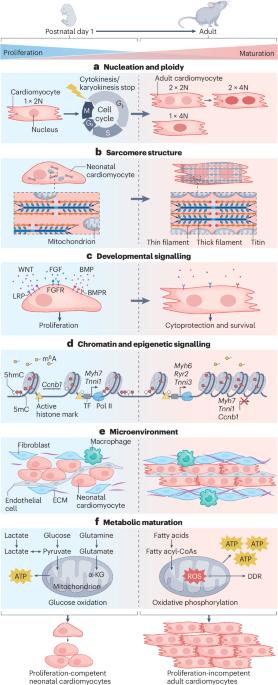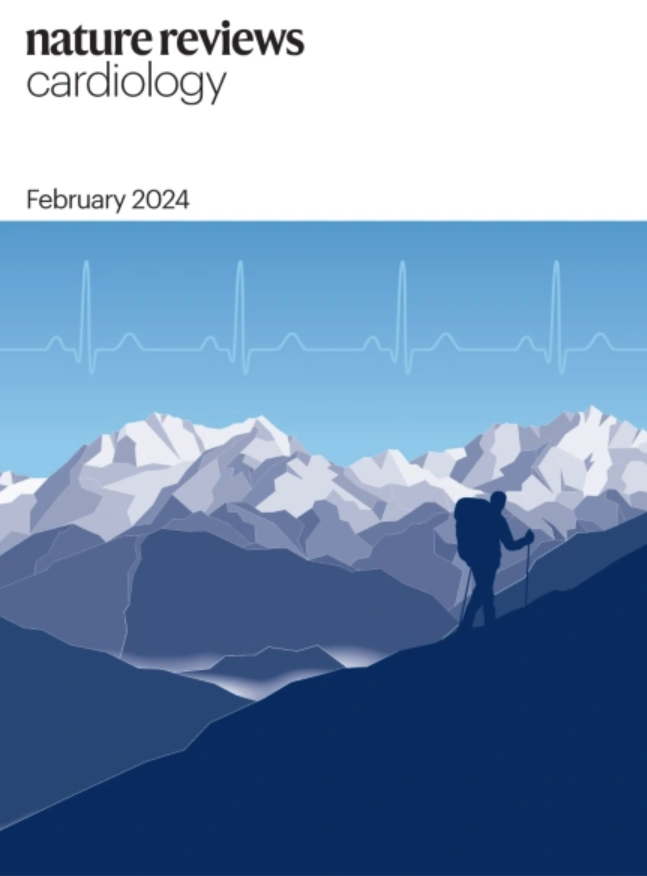Molecular gatekeepers of endogenous adult mammalian cardiomyocyte proliferation
IF 44.2
1区 医学
Q1 CARDIAC & CARDIOVASCULAR SYSTEMS
引用次数: 0
Abstract
Irreversible cardiac fibrosis, cardiomyocyte death and chronic cardiac dysfunction after myocardial infarction pose a substantial global health-care challenge, with no curative treatments available. To regenerate the injured heart, cardiomyocytes must proliferate to replace lost myocardial tissue — a capability that adult mammals have largely forfeited to adapt to the demanding conditions of life. Using various preclinical models, our understanding of cardiomyocyte proliferation has progressed remarkably, leading to the successful reactivation of cell cycle induction in adult animals, with functional recovery after cardiac injury. Central to this success is the targeting of key pathways and structures that drive cardiomyocyte maturation after birth — nucleation and ploidy, sarcomere structure, developmental signalling, chromatin and epigenetic regulation, the microenvironment and metabolic maturation — forming a complex regulatory framework that allows efficient cellular contraction but restricts cardiomyocyte proliferation. In this Review, we explore the molecular pathways underlying these core mechanisms and how their manipulation can reactivate the cell cycle in cardiomyocytes, potentially contributing to cardiac repair. To regenerate the injured heart, cardiomyocytes must proliferate to replace lost myocardial tissue, but this capacity is largely absent in adult mammals. In this Review, Koopmans and van Rooij explore the key pathways that drive cardiomyocyte maturation after birth and how targeted manipulation might reactivate the cell cycle in adult cardiomyocytes.


内源性成年哺乳动物心肌细胞增殖的分子看门人
心肌梗死后不可逆的心脏纤维化、心肌细胞死亡和慢性心功能障碍对全球卫生保健构成重大挑战,目前尚无治愈性治疗方法。为了使受伤的心脏再生,心肌细胞必须增殖以取代失去的心肌组织——成年哺乳动物为了适应苛刻的生活条件,在很大程度上已经丧失了这种能力。通过使用各种临床前模型,我们对心肌细胞增殖的理解取得了显著进展,导致成年动物成功地重新激活细胞周期诱导,心脏损伤后功能恢复。这一成功的核心是针对出生后驱动心肌细胞成熟的关键途径和结构——成核和倍性、肌节结构、发育信号传导、染色质和表观遗传调控、微环境和代谢成熟——形成一个复杂的调控框架,允许有效的细胞收缩,但限制心肌细胞增殖。在这篇综述中,我们探讨了这些核心机制背后的分子途径,以及它们的操纵如何重新激活心肌细胞的细胞周期,从而可能有助于心脏修复。
本文章由计算机程序翻译,如有差异,请以英文原文为准。
求助全文
约1分钟内获得全文
求助全文
来源期刊

Nature Reviews Cardiology
医学-心血管系统
CiteScore
53.10
自引率
0.60%
发文量
143
审稿时长
6-12 weeks
期刊介绍:
Nature Reviews Cardiology aims to be the go-to source for reviews and commentaries in the scientific and clinical communities it serves. Focused on providing authoritative and accessible articles enriched with clear figures and tables, the journal strives to offer unparalleled service to authors, referees, and readers, maximizing the usefulness and impact of each publication. It covers a broad range of content types, including Research Highlights, Comments, News & Views, Reviews, Consensus Statements, and Perspectives, catering to practising cardiologists and cardiovascular research scientists. Authored by renowned clinicians, academics, and researchers, the content targets readers in the biological and medical sciences, ensuring accessibility across various disciplines. In-depth Reviews offer up-to-date information, while Consensus Statements provide evidence-based recommendations. Perspectives and News & Views present topical discussions and opinions, and the Research Highlights section filters primary research from cardiovascular and general medical journals. As part of the Nature Reviews portfolio, Nature Reviews Cardiology maintains high standards and a wide reach.
 求助内容:
求助内容: 应助结果提醒方式:
应助结果提醒方式:


